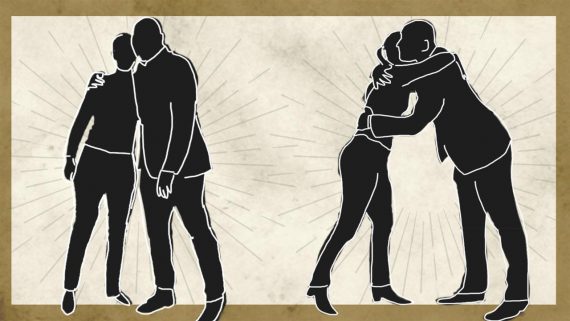Ephesians 2 is one of the most misunderstood and misapplied chapters of the Bible. This study provides a brief overview of how to understand Ephesians 2, and then takes a deeper look at Ephesians 2:1 as an introduction to the chapter. We also discuss a question from a reader about the problem of peace in the Middle East.
Israel and the Palestinian Conflict
 I recently received this question from Aaron:
I recently received this question from Aaron:
Just listened to your recent podcast about Ephesians and with the comments as to the situation in Israel and Palestine. I found the two particularly contrasting – you seem to be so close and yet so far. Theologically, you are on the side which understands the immediacy of the kingdom of God and our participation in it in the here and now through loving our neighbors, and your understanding of deliverance and heaven on earth are testament to that (I thank God you’re not a fundamentalist). Yet your discourse about Israel and its right to occupy, or in your words defend, was seemingly of stark contrast to your theological position. I’m not sure the argument that the subsequent occupation after the six day war ‘for defensive purposes’ holds much water at all.
Specifically, I wonder what your response is towards the following two videos. Some Israelis seem to be in less denial about what they are doing to Palestinians than the west in general. And for the second video, just provides more context than just the immediate aftermath of six day war.
First of all, let me clarify that I am a fundamentalist, at least, according to the original definition of the term. Originally, the term referred to a set of 90 essays titled (#AmazonAdLink) The Fundamentals published by R. A. Torrey and A. C. Dixon between 1910 and 1915, published in 12 volumes. But that’s not what the question is about.
I watched both videos, and I don’t disagree with the overall message of either video. There is a history of problems between Hebrews and the Arabs living in Israel, and there are extremists on both sides that want to see the other side destroyed. I have never taught otherwise.
The first video however, with Assaf Harel on Haaretz.com, made some claims I want to challenge. He said, for example, that Israel is an Apartheid state. But it isn’t. At least, not according to the political and dictionary definition of Apartheid. As I stated earlier, Israel is a true democracy and is the only democracy in the Middle East. Israel affords its Arab citizens full rights. Arab Israelis are full participants in Israeli society. They vote in elections and Arab parties sit in parliament. There are Arab justices on the Supreme Court. About 20% of doctors in Israel and about half of pharmacists are Arab. Now, 20% is clearly not a majority, and so I agree that it is difficult for that 20% to rule over the other 80%, but 20% numbers make perfect sense when you realize that Arabs represent 20% of the population, which is exactly what you would expect in a representative democracy. So no, Israel is not an apartheid state.
He went on to indicate that Israel is withholding water, energy, and basic food necessities from the Arab Israelis. But they aren’t. It is Hamas doing that. The Arab Israelis have received billions and billions of dollars in aid from the United States and other countries. In fact, Israel herself has given tens of millions of dollars to the Palestinian Authority. But rather than use that aid to upgrade their infrastructure or provide for the basic necessities of the people, the Palestinian Authority gives most of the money to Hamas who then uses it to buy weapons and train soldiers. Here’s an article from Forbes which shows this and another from the Wall Street Journal which shows the problem persists to this very day. More detailed facts and figures are found here.
If someone is poor and I give them $1000 to buy food and clothing for their children, but they use the money to buy guns and ammo to attack me, I am not going to be too keen about the idea that they are only attacking me because I am starving their children.
Then his whole argument about violent extremists was quite illogical. He basically argued that there was no such thing as violent extremists because the it was only the right wing extremists who were accusing their opponents of being violent extremists, which proves that it is really the right wing extremists who are the violent ones. Assaf Harel is correct in that we tend to accuse others of that for which we ourselves are guilty, but this doesn’t mean that one side is violent and other is peaceful. It means both sides are violent and both sides need to own up to their contributions to violence.
Which brings me to the best line in the entire video. He said this: “If only for once we could be smart enough to reach a peace agreement before the war.”
Yes. But the solution to this is twofold. It requires truth and forgiveness.
 First, truth. Peace does not require truth about our enemies, but truth about ourselves. Finger pointing always leads to war. But it is only we can look at our own face in the mirror that we can own up to our own violence and bring an end to it.
First, truth. Peace does not require truth about our enemies, but truth about ourselves. Finger pointing always leads to war. But it is only we can look at our own face in the mirror that we can own up to our own violence and bring an end to it.
Second, forgiveness. We must learn to forgive those on the other side. Whether they ask for it or not. Whether they own up to their part in the problem or not.
The sad reality in the Middle East, and indeed, in most human conflict, is that the two opposing sides refuse to perform either of these two requirements. And so there can be no peace.
As for me, I am not blaming the Arab people in Israel for the problem. But I will also not blame the Jewish people. Neither will I let either side off the hook. Both sides are at fault, and both must own up to their own faults and also extend forgiveness to the other side if there is to be peace.
Now, again, they will never do this because it is not what nations do. It is, however, what individuals can do, and maybe, just maybe, as we who follow Jesus learn to love one another with truth and forgiveness in our own lives, we can lead the nations to follow in our example.
Which is a perfect transition into the text we are studying today … Ephesians 2:1.
The Big Picture Message of Ephesians 2
Ephesians 2 is one of the most misunderstood chapters in the New Testament. This is largely due to our tendency to read everything in the Bible through “heaven-colored glasses” so that every passage about sin and salvation is thought to be about going to heaven when we die. So when most people teach and write about Ephesians 2, they see the references to death, sin, and satan in Ephesians 2:1-3 and then the references to grace, faith, and salvation in Ephesians 2:4-10, and think that this passage is about avoiding the consequences of sin so we can go to heaven when we die.
As a result, the text of Ephesians 2:8, “… for by grace you have been saved through faith …” is almost as widely known as John 3:16. So when you hear pastors or Bible college professors teach about Ephesians 2:1-10, the message you usually hear about this passage goes something like this:
We humans are evil sinners, under the control of the devil and our sin nature. We were dead and unable to do anything to change. Worse yet, because of sin, God’s wrath burns against us, and He wants to send us all to hell. But thankfully, God sent Jesus to help us get to heaven and if you believe in Jesus, you can go to heaven when you die.
Now honestly, I don’t truly have much a problem with those statements. In general, I agree with the basic facts as stated. However, I am convinced that this is NOT what Paul is writing about in Ephesians 2. Though the statements above are taught in Scripture, they are not taught in Ephesians 2.
In the next several podcasts studies, I am going to present a radically different understanding of Ephesians 2 which will help you see what Paul was really talking about, and how his message makes much more sense in the overall flow and structure of Ephesians. You will also discover that Ephesians 2 becomes much more applicable to our lives and to the church today.

But before we start looking at the text, let me just tip my hand and give you a preview of where we are headed. Here are some of the key truths which impact our understanding of Ephesians 2.
- Ephesians 1 has just ended with a statement by Paul that he is going to show the church how the church, as the body of Jesus in this world, is the only solution to all of the problems in this world. In Ephesians 2, Paul addresses the GREATEST problem in the world, and shows how Jesus calls the church to fix it.
- The central truth of Ephesians 2 is discovered by reverse engineering the chapter. Paul has a clear progression in Ephesians 2, following the “Problem (Ephesians 2:1-3) – Solution (Ephesians 2:4-10) – Application (Ephesians 2:11-22)” format. If all the “sins” we Christians like to focus on were really the issue for Paul, Paul’s train of thought would conclude with an application about how we must stop lusting, lying, stealing, etc. But Paul does not go there at all. Instead, Paul ends his train of thought by talking about how Jews and Gentiles, who used to hate each other, are now brought together in peace and unity as one family. Therefore, since this is the application Paul aims for, then the problem and solution must logically lead up to this application. The problem in Ephesians 2:1-3, then, cannot be about the “sins” we Christians often focus on, but rather, the “sins” we tend to ignore and overlook, which are the sins that create disunity and enmity between ourselves and other people in the world. These are the sins of hatred, accusation, blame, scapegoating, and rivalry. These are the sins that dehumanize us and dehumanize others. In other words, the sin that Paul is concerned with is the bigotry, racism, and hatred that exists between various people groups on earth. Paul wants all such hatred to end, and for there to be unity and love in the world, and Ephesians 2 shows us how to do this.
- So, with this in mind, the word “dead” in Ephesians 2:1 does not mean “non-existent,” nor does it refer to “total inability”. Instead, it refers to powerlessness, weakness, corruption. It is to be understood in light of Genesis 3–5 where sin leads to death, which is primarily physical death, and especially the death of murder.
- The spirit of the power in Ephesians 2:2 is a reference back to Ephesians 1: 21 and points to the rule and dominion of satan. But satan is best understood in light of what his name means, which is accuser. The course of this world, the spirit of this age, is the spirit of accusation and blame. Religious people are quite guilty of engaging in these activities, which means that the trespasses and sins in view is not the “sins” we Christians often condemn in others, but is actually the true “sin” of accusing and condemning others. Paul is most concerned here with the same thing that Jesus was most concerned with, which is the religious sins which people commit in God’s name. When these things are corrected by God (Ephesians 2:4-10), peace and unity result (Ephesians 2:11-22).
- We know this because Paul includes himself in the description of engaging in these practices, and yet he kept the law perfectly. So what sins did Paul engage in along with everybody else? The sin of accusation and blame, which leads to scapegoating violence and murder. These things all come from desire, which Paul also mentions in the context, and also takes us back to Genesis 3–4.
- There is no mention of “the sinful nature” in Ephesians 2:1-3. This phrase from the NIV is a tragic mistranslation of the Greek text. Paul is talking about the lusts and desires of the flesh. The “flesh” refers to our physical body, and it is from our flesh that lusts and desires rise, as we imitate and covet what other people have.
- Wrath, then, is not God’s wrath toward us, but human wrath directed toward one another (which we then justify by blaming it on God). Wrath is when we engage in violence against others, and do so in God’s name. It does not come from God, nor does it have anything to do with hell or eternal punishment.
- The solution to this great problem is found in Ephesians 2:4-10, and is based entirely on the grace of God and accepting by faith what Jesus has revealed on the cross about the problem of humanity and how to fix it.
The bottom line summary of Ephesians 2, then, is this:
We humans live in a world of sin and death, which we inflict upon ourselves by accusing, condemning, and killing one another, and justifying it all by doing these things in God’s name. We did these things because in our flesh, we knew no other way to live. We religious people killed and were killed, just like everyone else. But Jesus revealed the way to peace, and if we believe and follow the way of Jesus, then the church can lead the world into the way of peace as well.
That summary is very different than the first summary above!
I know that’s a lot of information, and is a challenge to comprehend all at once. So over the course of the next several podcasts, I will unpack all of this in much more detail. We begin today with a brief look at Ephesians 2:1
Dead in Trespasses and Sins (Ephesians 2:1)
In Ephesians 2:1, Paul says this:
As for you, you were dead in your transgressions and sins …
This is the beginning of Paul’s description about how our life used to be before we were Christians. Before we learned the truth that Jesus revealed (which Paul will discuss later).
To properly understand this verse, we must grasp what Paul means when he describes humanity as being “dead” and then also what he means when he refers to trespasses and sins.
I will cover both of these terms at great length in my Gospel Dictionary online course, but they are also discussed in my book, (#AmazonAdLink) Nothing But the Blood of Jesus.
What does it mean to be “dead”?
Many Christian leaders say that the word “dead” means non-existent or completely powerless to do anything. It is not uncommon to hear pastor says, “A dead person can’t do anything. The body just lies there. It can’t talk. It can’t think. It can’t walk or move. So also, a person who is spiritually dead is unable to do anything that helps them move closer to God. They can’t think properly about spiritual matters. They can’t believe in Jesus. They are totally unable to do anything spiritually good.”
This sort of teaching is completely wrong. It is not true and it does not fit with the biblical understanding of the word “dead.”
 In my online course and my book, I teach that the word “dead” refers to something that is not functioning properly.
In my online course and my book, I teach that the word “dead” refers to something that is not functioning properly.
Theologically, the words death and dead refer to that which is inactive, powerless, not properly functioning for life as God intended. The words refer to that which is separated from its God-given purpose. To be dead is to be deprived of power. For example, Paul writes in Romans 4:19 that Abraham was dead, even though he was very much alive. What does Paul mean? He means that Abraham was powerless to perform. He was not functioning properly (cf. Heb 11:12). This is the way the words “dead” and “death” can be understood in all the contexts they are used.
So when someone physically dies, they are no longer functioning properly in life the way God planned and intended. Death was never supposed to touch human beings. Similarly, when someone who is alive is described as being dead, it means that something about them is not functioning properly the way God intended. Such a definition fits with all forms of death, no matter what kind of death is in view.
It is important to note that the words dead and death do not mean “non-existent” or to “total inability.” The words never carry these sorts of ideas. A dead body does exist; it is just not functioning properly. Abraham could be described as dead, even though he was alive, because his body was not functioning the way God intended. Similarly, dead plans or dead faith do exist, they just are not being carried out properly.
So when Abraham was described as being dead, even though he was alive, this was a symbolic form of death, in which his body was not functioning the way God intended. Physical death is similar. God never intended for humans to die, and so when our life leaves our bodies, we physically die. We are no longer functioning physically in our bodies the way God wanted or planned.
Then there is spiritual death. When we think of someone being spiritually dead, it means that although they do indeed have a spirit, the spiritual side of them is not functioning the way God intended. They are separated from the God-given functions for which they were created.
Eternal death speaks of the idea that people fail to function in eternity the way God desired and intended. Then the Bible can also use the word dead in reference to inanimate or intangible items, such as faith. In such cases, the words dead or death simply mean that the object under discussion is not properly functioning or being carried out as planned.
So when Paul writes here about us being dead, he is not thinking about total inability or any such thing. He is simply saying that we were not functioning properly as God intended. We did the opposite things God wanted and desired. Paul doesn’t mean we couldn’t think about spiritual things or do anything good.
He is saying that, as humans, we are not functioning as humans should. We are failing to live up to our calling and purpose as humans. The word “dead” here has nothing to do with spiritual death or physical death, but to humanity’s death. The death of the human race as God’s image in this world … and specifically, the death of the church as the body of Jesus in this world. That is the “death” Paul has in mind.
We are dead in that we fail to live up to what God wanted us to do and be. We are alive (Ephesians 2:2), but are flunking at life.
Why did we fail? Rather than do what God wanted, what did we do instead?
Trespasses and Sins
Our failure at life is described in the last half of Ephesians 2:1 with the terms “trespasses and sins.”
This is two different words for the same idea. Again, the term “sin” is a word I will cover at great length in my my Gospel Dictionary online course, and which is already covered in my book, (#AmazonAdLink) Nothing But the Blood of Jesus. I also covered an explanation of sin in great detail in my podcast studies on Genesis 3-4.
In brief, while sin can be understood as disobeying God, the Bible is much more specific than that about the nature and character of sin. In the Bible, sin is specifically the pattern of rivalry and scapegoating other people that leads to humans committing violence in God’s name.
Sin is a failure to live as fully human beings in the image of God. This is why sin is so closely connected with death here in Ephesians 2:1.
When we sin, we are not functioning properly as humans. We are not living up to God’s standard of us living in love toward one another, but are instead doing the exact opposite by living in hate, anger, and violence.

Sin is not so much about pride and rebellion or thinking we know better than God as it is about living as less than human. Sin is the dehumanization of ourselves and others. It is the problem of broken human relationships between God and one another. Relationships are key to being human, and when we are living as less than human, it surfaces in how we interact with God and with others.
So what is Paul saying in Ephesians 2:1? He is describing the human condition, but in ways that few people have ever really considered before. Paul is saying that the great problem with humanity is that we have failed to function properly as the image of God on earth. Or, to put it in terms related to the church, we have failed to function properly as the body of Jesus Christ on earth.
Instead of live up to what God desired and intended for us, we did the opposite. We have lived in sin. Rather than love one another, we hate one another. Rather than serve and build up one another, we kill and tear down one another. Rather than function as one family of God, we live in bigotry and racism, seeking to portray our enemies as monsters and as less than human, so that we might justify our violence against them, so that we might kill them in the name of God.
To go back to the question from the reader about the problem of peace in the Middle East, one of the big problems is that everyone want to blame and accuse someone else of the problems that exist in Israel. The Arabs blame the Jews and the West, and the Jews blame the Arabs and the Muslims. All groups seek to dehumanize the other groups so that they can attack and kill them or just ignore and abuse them. And since this conflict is religious in nature, all sides claim that God is on their side.
This is the exact problem that Paul addresses in Ephesians 2. Right now, he is just laying out the problem, but he will soon address the solution to the problem and how to apply this solution to the problem of the world. In this way, Ephesians 2 address one of the most significant and long-lasting problems in human history … the problem of two or more groups of people who hate each other and want to see the other group destroyed.
Are you beginning to see that Paul is talking about something much different, and much more practical, than the teaching about how to go to heaven when we die?
Yes, and in fact, Paul’s description here of the problem of humanity is not just about unregenerate unbelieving non-Christians, but is also about those who claim to follow Jesus.
Far too often, it is we Christians who seek to dehumanize our enemies so that we might accuse and condemn them in God’s name, and even call for their death and destruction in God’s name. When we do this, we are living in death. We are living in sin. We are, as Paul will say next, living satanically.
Did you know that Christians can be satanic? Yes, that is what will begin to see next time when we look at Ephesians 2:2.
For now, though, I just want to leave you with a word of caution.
 Be careful about accusing and condemning others. If you are into politics, it is very easy to start seeing your political opponents as monsters. As less than human. It is easy to start calling them names and wishing for their death. That is the sin Paul has in view here in Ephesians 2:1.
Be careful about accusing and condemning others. If you are into politics, it is very easy to start seeing your political opponents as monsters. As less than human. It is easy to start calling them names and wishing for their death. That is the sin Paul has in view here in Ephesians 2:1.
Or maybe it’s a group of people from another religion. The Muslims. Or the Atheists. Or … more close to home … the liberal Christians … or the evangelical Christians. When we start condemning and accusing them and thinking of them as our enemies, we are falling into sin.
The same applies for issues of race. Hopefully you don’t hate people who have a different skin color than you, but we’re starting to see more and more of this now, especially in the area of accusing other people of being racist simply because they have a certain skin color.
All such things must stop for all such things are sinful and cause us to live in death. We will discuss this concept more next time when we look at Ephesians 2:2.







 This is what it means to be “dead in sins.” We are surrounded by an atmosphere, a system, a world of sin, which leads to death … death through murder, warfare, hatred, killing, condemning, scapegoating, and all things related to this.
This is what it means to be “dead in sins.” We are surrounded by an atmosphere, a system, a world of sin, which leads to death … death through murder, warfare, hatred, killing, condemning, scapegoating, and all things related to this.





 Very rarely does it refer to something that is completely unable to act.
Very rarely does it refer to something that is completely unable to act.



